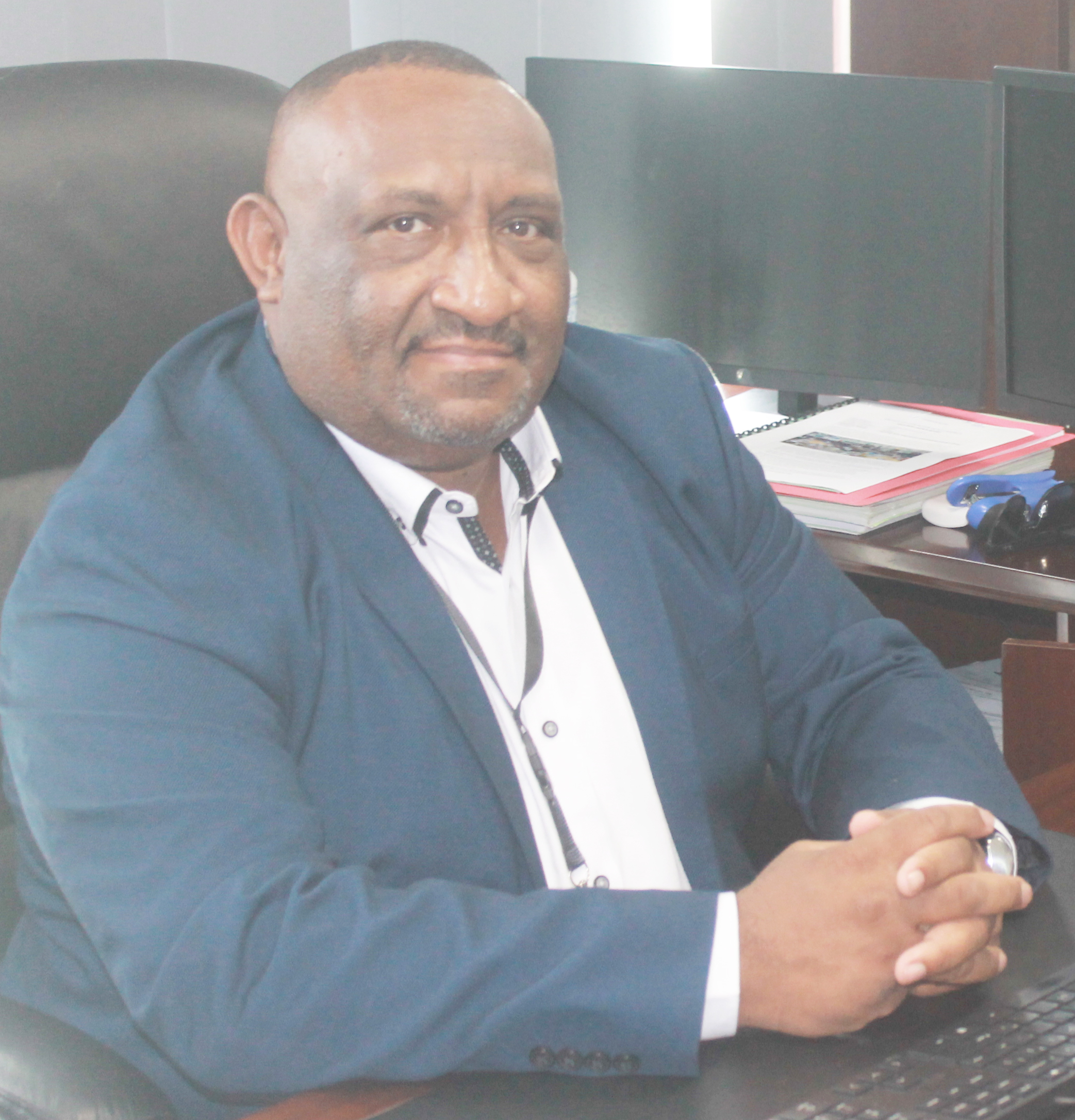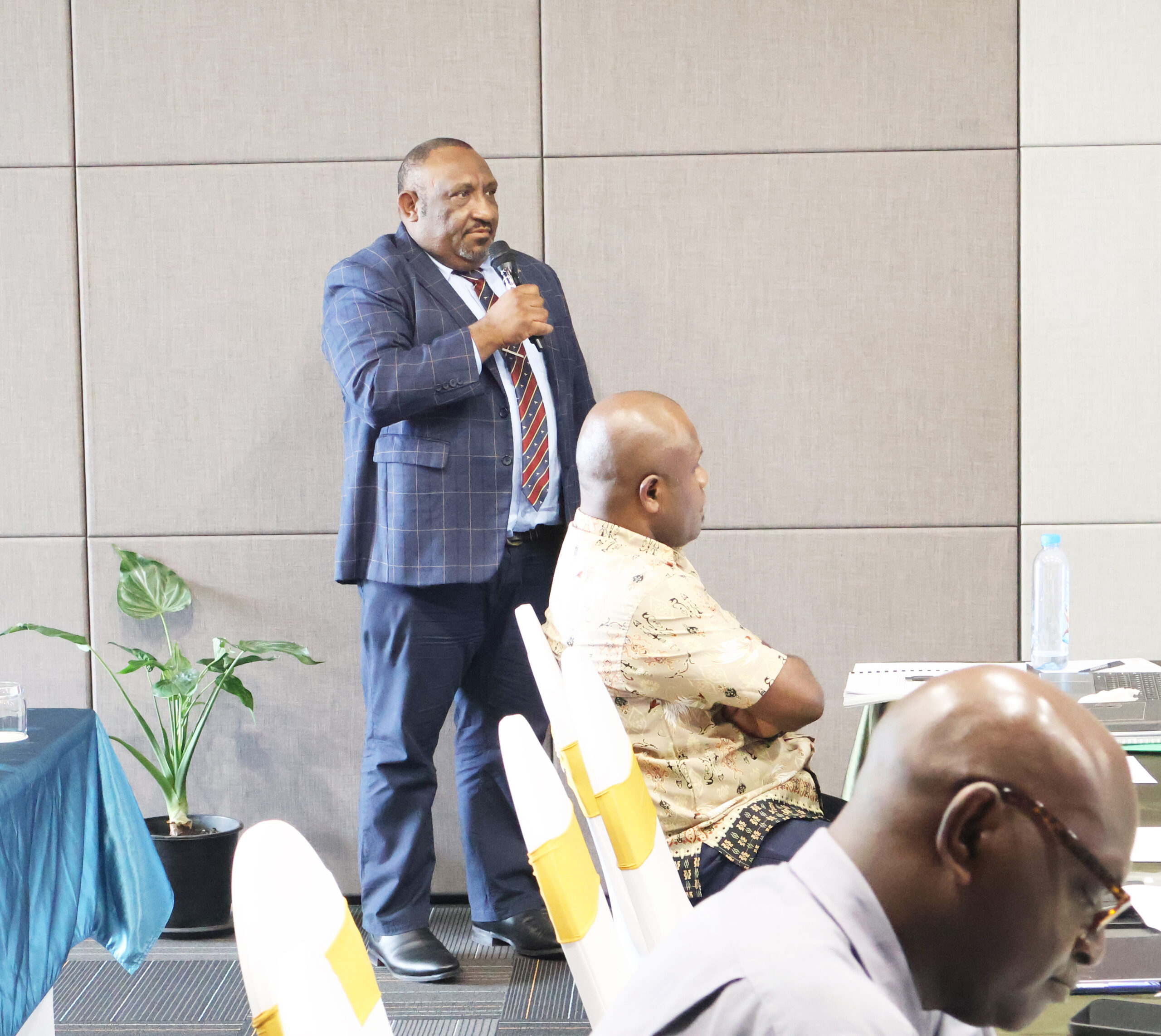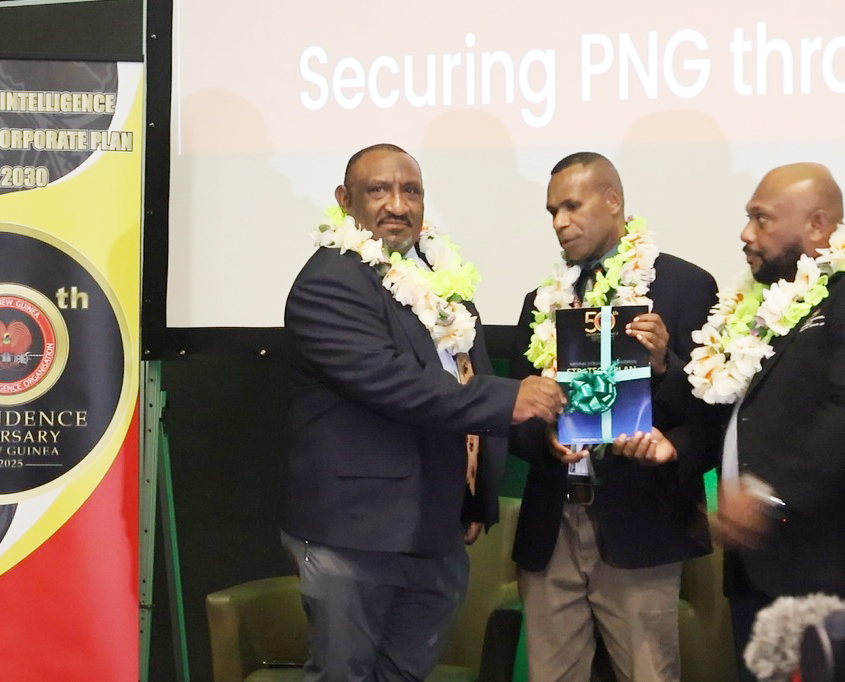Latest News
Latest News and Updates

PNG NIO Director General Addresses The 2025 National Development Forum
National Security
I would like to extend my heartfelt gratitude to the CIMC for inviting me to this significant event—the 2025 National Development Forum- Strengthen the Rule of Law for the future generation of our country. It is an honour to address you today on matters of national security, particularly regarding the operations and ongoing work of the National Intelligence Organisation (NIO) of Papua New Guinea in the National Security theatre.
Background of the National Intelligence Organisation
The NIO, established under the National Intelligence Organisation Act, has a critical mandate to collect, collate, and disseminate intelligence information to the government. This encompasses all issues—both domestic and international—that impact our national security. The NIO plays a vital role in ensuring that the government receives the best advice for policy formulation and critical decision-making.
Since its inception in 1974, the NIO has undergone significant transformations. Initially attached to the police, it has evolved into a dedicated intelligence agency. Over the years, progress has been made under various Director Generals, although the extent of these improvements has often depended on the support provided by successive governments. I will not dwell too much on the past but will focus where PNGNIO is now at this stage.
Current Focus and Initiatives
As I stand before you, I want to emphasize the current priorities of the NIO under my leadership. Our foremost goal is to empower the Organisation to effectively address the evolving national security trends, both internally and externally. The threat environment continues to shift, influenced by globalization and other factors including the evolution of Technology and AI.
With the current NIO Act 1984, the mandated functions have limited NIOs operability in the space of intelligence given the evolving changes in shapes, type and forms of threats that we are face today. The amendment of the act will provide a conducive but a real time approach in dealing with National Security issues.
To this end, we are undertaking a comprehensive review of the PNGNIO Act, which has not been updated since its inception in 1984. This review process began last year, and we anticipate completing regional consultations this year before presenting the revised Act to Parliament for enactment.
The review of the PNGNIO Act 1984 coincides with significant reforms initiated by the current government, notably the establishment of National Security Agency (NSA). This agency is designated as the central coordinating body of all national security matters, aligning with the recently updated National Security Policy for 2024-2029 that provide the architectural framework of our National Security Sector.
The revised PNGNIO Act aims not only to empower the organisations to fulfill its mandated functions effectively but also to ensure its alignment with the National Security Policy, which emphasizes the importance of six (6) intelligence communities. Within this framework, the PNGNIO is positioned as the lead agency for the Intelligence Community, reinforcing its critical role in the national intelligence landscape.
In addition, we are committed to enhancing the manpower capacity of the Organisation over the next few years. This will involve a major restructuring of our organizational framework to ensure that we are adequately positioned to address security issues nationwide, especially in light of our growing population and the increase in the dynamics of threats we are faced this days.
Addressing National Security Threats
When we talk about National Security threats, what do we mean?
The threats to our national security are multifaceted and include:
Transnational criminal activities;
Cross-border smuggling of illegal weapons and illicit drugs;
People smuggling and trafficking;
Threats to major resource projects;
Tribal conflicts spilling over into urban areas;
Economic espionage;
Domestic and international terrorism;
Border incursions;
Food & Energy Security;
Cyber-attacks; and
many more national security threats.
These issues pose significant challenges to our sovereignty and national security. It is imperative that we remain vigilant and proactive in our efforts to mitigate these threats.
Support from the Government
I am pleased to report that the Marape/Rosso Government has shown strong support for the NIO’s initiatives, particularly through the recently launched Medium-Term Development Plan 4 (MTDP 4), in particular Strategic Priority Area 6, Deliberate Intervention Program 6.6, which emphasizes the improvement and enhancement of the NIO’s capacity and capabilities. We are also actively working on internal policies to ensure that the Organisation is agile and effective in executing its mandated functions so that it can be able fully function as an intelligence organisation.
Support from international partners
Papua New Guinea National Intelligence Organization (PNGNIO) operates under the guiding principle of the nation’s foreign policy, “Friends to all, enemies to none.” This approach underscores PNG’s commitment to fostering collaborative relationships with neighbouring countries and other Pacific Island nations, particularly on issues that collectively impact regional national security.
The emphasis of these diplomatic engagements and cooperative efforts is to facilitate the sharing of critical information among nations, thereby safeguarding our national security interests. This collaborative framework not only enhances security but also creates a conducive environment for sustainable development to flourish.
Coordination and Collaboration with other Stakeholders/Agencies
Coordinating with other state agencies in the sectors and other private entities continues to be the challenge in ensuring information and intelligence are shared on a timely manner.
However, that has become a thing of the past as the sector is now reinforcing the mechanism and farmwork/system that will enable information and intelligence sharing is properly regulated in the sector to achieve the outcome thru the establishment of the National Security Agency (formally OSCA) that will provide an oversight and coordination in this regard.
Conclusion
In conclusion, I would like to stress that national security is a prerequisite for development. Without a secure environment, our progress will be hindered. It is our collective responsibility to safeguard our nation against potential threats, whether they arise from state or non-state actors. Hence, having this forum thru CIMC provides that leverage and forum to cross check how far we have journeyed in the last 50years and how far can we go in the next 50 years in our efforts to Strengthen the Rule of Law for the future generation of our country.
Let us work together to ensure that we protect our national interests and foster an environment conducive to growth and development. National security is indeed everyone’s responsibility.
Thank you & God Bless

NIO ACT REVIEW
NIO's Director General Lieutenant Colonel Joshua Dorpar Officiating the NIO Act Review Workshop.
NIO ACT REVIEW
The NIO Act Review was held at the Loloata Island resort from July 9 -11, 2025.
Key stakeholders in the security space that participated in the Review of the 1984 National Intelligence Organisation Act includes the Department of Prime Minister , State Solicitor and Office of the Legislative Council.
The NIO Act was ennacted in 1984 and the bill passed in Parliament. It is almost 40 years since NIO has been in operation. However, with the evolving changes in the types of treats we face today unlike in the past, this has called for the NIO Act to be reviewed to capture the evolving global treats in Technological Advancements ,Artificial Intelligence, Transnational criminal activities, cross border smuggling of illigal weapons and drugs, people smuggling/trafficking, treats to major resource projects, tribal conflicts, economic espionage, domestic and international terrorism, border incursion, food and energy security and cyber attacks.

PNG NIO Launched Its Corporate Plan 2025 - 2030
The Papua New Guinea National Intelligence Organisation has launched its 5 Year Strategic Plan 2025 – 2030. It was a milestone achievement not only for the PNG NIO but for Papua New Guinea also.
The PNGNIO since its inception has been unguided by a Strategic Plan to enable the organisation to have a foresight on achieving its specific goals withing a given time frame in PNG’s security space. Under the leadership of the acting Director General for the PNG NIO, Lieutenant Colonel Joshua Dorpar, the PNG NIO Strategic Plan 2025 – 2030 was initiated and successfully launched on the 23rd of October 2025.
The PNG NIO Strategic Plan 2025 – 2030 gives insights to the Mandate and Core Functions of the organisation, Corporate Governance, Key Areas to produce results, Organisational Structure and the Monitoring and Evaluation phase. The Mandate and Core Functions of the PNGNIO outlines the principal responsibilities mandated to the organisation for the providence of reliable intelligence assessment reports to the PNG National Government for effective and fair decision making. The Corporate Governance emphasizes on the alignment of critical decisions with organisational goals and national security objectives. The Key Result Areas segment gives an overview of the Corporate Objectives of the PNG NIO. i.e. Strengthening national security through modern and responsive intelligence capabilities; safeguard PNG’s sovereignty and national interests; provide strategic intelligence forecasts and assessments to Government for the interest of national security; enhance intelligence oversight and governance; promote domestic security and good order; build strategic partnership and intelligence collaboration; advance organisational reform and capability development; and corporate governance. The PNG NIO Organisational structure outlines the organisational structure in terms of the Top Executive Leadership and the Functional Directorates. In accordance with the Planning and Monitoring Responsibility Act 2016, the Monitoring and Evaluation phase of the PNG NIO Strategic Plan gives greater emphasis on monitoring, reporting and evaluation performances of PNG NIO to measure the organisation’s performances against planned programmes, projects and activities.
During the launching of the PNG NIO Strategic Plan 2025 – 2030, the Acting Director General for the PNG NIO, Lieutenant Colonel Joshua Dorpar, proudly announced that the PNG NIO Corporate Plan 20205 -2030 will be fully operational in the next 5 years. The Director General acknowledges the support, guidance and directions of the Marape-Rosso Government and said that the PNG NIO has embarked on strengthening the operational mechanism and the policy frameworks of the PNG NIO in the last 18 months of his acting appointment. This is to enhance the functionality and operational effectiveness of the PNG NIO, he said. Lt Col. Joshua Dorpar further added that the Marapa-Rosso Government has emphasized on the importance of the National Security Sector in its development plan in capacity building, capability enhancement and infrastructure development. The launching of the PNG NIO Strategic Plan 2025 -2030 is part of the PNG’s NIO transformation and partway in executing the government’s intent. In the past years, the core functions of the organisation are executed without strategic partway that guides and provides leverage for the organisation to execute its goals and objectives. Working in isolation and on ad hoc bases drastically defies the progress in terms of functionality, operational effectiveness and capability infrastructure development aspirations.
The formulation of the PNG NIO Corporate Plan 2025 – 2030 is a mandatory government policy documented to strategically align PNG NIO’s corporate objectives and its strategic intense to achieve within a 5-year term. This is the first corporate plan for the organisation to be implemented. The corporate plan encompasses the principles of broader government policies such as the Vision 2050, MTDP and also the National Security Policy 2024 – 2029.

